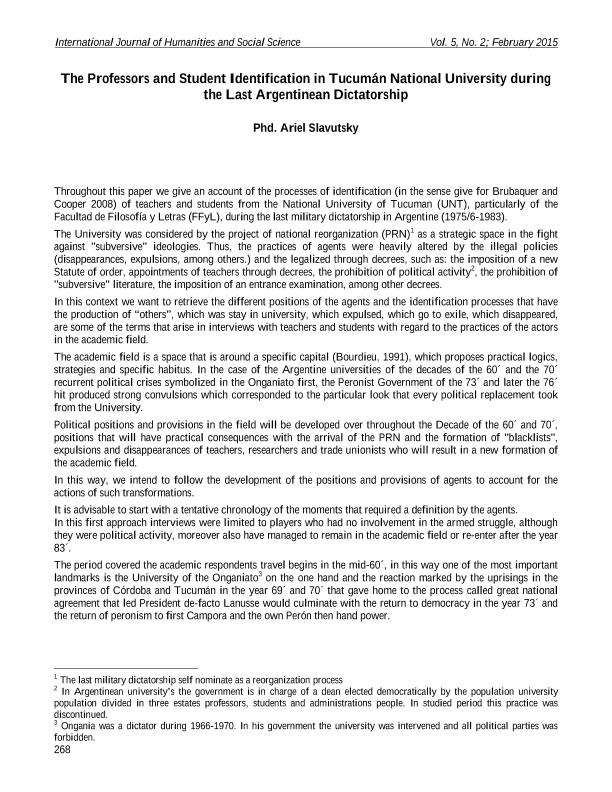Mostrar el registro sencillo del ítem
dc.contributor.author
Slavutsky, Ariel Ignacio

dc.date.available
2018-07-06T14:37:11Z
dc.date.issued
2015-02
dc.identifier.citation
Slavutsky, Ariel Ignacio; The Professors and Student Identification in Tucumán National University during the Last Argentinean Dictatorship; Center for Promoting Ideas; International Journal of Humanities and Social Science; 5; 2; 2-2015; 268-274
dc.identifier.issn
2220-8488
dc.identifier.uri
http://hdl.handle.net/11336/51475
dc.description.abstract
Throughout this paper we give an account of the processes of identification (in the sense give for Brubaquer and Cooper 2008) of teachers and students from the National University of Tucuman (UNT), particularly of the Facultad de Filosofía y Letras (FFyL), during the last military dictatorship in Argentine (1975/6-1983). The University was considered by the project of national reorganization (PRN as a strategic space in the fight against "subversive" ideologies. Thus, the practices of agents were heavily altered by the illegal policies(disappearances, expulsions, among others.) and the legalized through decrees, such as: the imposition of a new Statute of order, appointments of teachers through decrees, the prohibition of political activity , the prohibition of "subversive" literature, the imposition of an entrance examination, among other decrees. In this context we want to retrieve the different positions of the agents and the identification processes that havethe production of ?others?, which was stay in university, which expulsed, which go to exile, which disappeared, are some of the terms that arise in interviews with teachers and students with regard to the practices of the actors in the academic field. The academic field is a space that is around a specific capital (Bourdieu, 1991), which proposes practical logics, strategies and specific habitus. In the case of the Argentine universities of the decades of the 60´ and the 70´ recurrent political crises symbolized in the Onganiato first, the Peronist Government of the 73´ and later the 76´ hit produced strong convulsions which corresponded to the particular look that every political replacement took from the University.Political positions and provisions in the field will be developed over throughout the Decade of the 60´ and 70´, positions that will have practical consequences with the arrival of the PRN and the formation of "blacklists", expulsions and disappearances of teachers, researchers and trade unionists who will result in a new formation of the academic field. In this way, we intend to follow the development of the positions and provisions of agents to account for the actions of such transformations.
dc.format
application/pdf
dc.language.iso
eng
dc.publisher
Center for Promoting Ideas
dc.rights
info:eu-repo/semantics/openAccess
dc.rights.uri
https://creativecommons.org/licenses/by-nc-sa/2.5/ar/
dc.subject
Identification
dc.subject
University
dc.subject
Argentina
dc.subject
Dictatorship
dc.subject.classification
Historia

dc.subject.classification
Historia y Arqueología

dc.subject.classification
HUMANIDADES

dc.title
The Professors and Student Identification in Tucumán National University during the Last Argentinean Dictatorship
dc.type
info:eu-repo/semantics/article
dc.type
info:ar-repo/semantics/artículo
dc.type
info:eu-repo/semantics/publishedVersion
dc.date.updated
2018-07-05T13:36:36Z
dc.identifier.eissn
2221-0989
dc.journal.volume
5
dc.journal.number
2
dc.journal.pagination
268-274
dc.journal.pais
Estados Unidos

dc.description.fil
Fil: Slavutsky, Ariel Ignacio. Universidad Nacional de Jujuy. Facultad de Humanidades y Ciencias Sociales; Argentina. Consejo Nacional de Investigaciones Científicas y Técnicas; Argentina
dc.journal.title
International Journal of Humanities and Social Science
dc.relation.alternativeid
info:eu-repo/semantics/altIdentifier/url/http://www.ijhssnet.com/journal/index/2982
Archivos asociados
